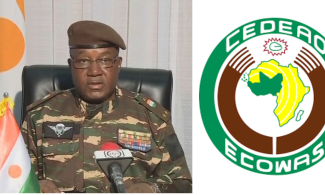The recent imposition of sanctions by the Economic Community of West African States (ECOWAS) on Niger Republic demands a critical reassessment. While the intention behind these measures is to uphold democratic principles and regional stability, their impact on the general populace cannot be overlooked. As Niger grapples with the consequences, it is imperative for ECOWAS leaders, especially Nigeria’s President Bola Tinubu, to consider alternative approaches to resolve the current political impasse. There are multifaceted implications of these sanctions, highlighting the need for a shift from punitive measures to constructive dialogue and negotiation for a peaceful transition back to democracy.
The sanctions imposed on Niger Republic have had a significant economic and humanitarian toll on the people of the nation. Already grappling with poverty and limited resources, these additional constraints are exacerbating the hardships faced by ordinary citizens. Niger, a landlocked country, is facing food insecurity, lack of access to essential services, and economic stagnation which are just a few of the immediate consequences that call for urgent attention. The people of Niger, who bear the least responsibility for the political turmoil, are the ones bearing the brunt of these decisions our country – Nigeria took.
It is crucial to consider whether the actions of ECOWAS leaders and the international community, while well-intentioned in promoting democracy, are inadvertently making life even more challenging for the very people they aim to help. Economic sanctions, in particular, are further diminishing the quality of life for the Nigerien population. If these measures continue, there is a significant risk of an influx of economic migrants from Niger Republic spreading across West African countries and beyond, with Nigeria being the primary destination due to its proximity, cultural affinity, and good neighbourliness.
Moreover, if ECOWAS, especially Nigeria, continues to push the people of Niger Republic into economic turmoil, it may create an avenue for the frustrated population along the fringes of Lake Chad to turn to criminal activities, exacerbating security challenges in the region. The consequences of such a scenario would not only affect Niger Republic but also neighbouring countries, including Nigeria, which could face increased security threats.
In such a delicate situation, the emphasis must shift from punitive measures to constructive dialogue and negotiation. The immediate priority should be the release of President Muhammad Bazoum and his family from custody. This step should serve as the basis for initiating talks between all stakeholders involved. This approach aligns with the principles of justice and fairness, and it also opens up avenues for a more inclusive and participatory process in restoring democracy and stability to Niger Republic.
The journey back to democracy in Niger Republic should be guided by the principles of inclusivity, transparency, and respect for human rights. ECOWAS can play a pivotal role in providing a platform for dialogue, supporting electoral reforms, and ensuring the participation of all political and social groups in the process. A well-structured transition, backed by international support and oversight, can pave the way for a more stable and democratic Niger, which is not only good for the nation itself but also the broader African region.
It is evident that the current diplomatic efforts have failed to produce the desired results. The prolonged detention of President Bazoum and his family serves as a stark reminder of the pressing need for a change in approach. Keeping them in custody for such an extended period undermines the principles of justice and due process. The international community, particularly ECOWAS, and Nigeria, must reevaluate their strategies and recognise that diplomacy, not punitive measures, is the path to lasting peace and democracy.
ECOWAS, as a regional organisation committed to promoting peace, stability, and democracy, should take a leading role in resolving the crisis in Niger Republic. ECOWAS can leverage its diplomatic influence and convening power to bring all stakeholders to the negotiating table. President Bola Tinubu, as a prominent figure within ECOWAS, has a pivotal role to play in advocating for a peaceful resolution.
Furthermore, ECOWAS can work closely with international partners and organisations to provide technical assistance and support for electoral reforms in Niger Republic. This assistance can help ensure that future elections are conducted transparently and fairly, fostering confidence in the democratic process.
And also, the journey towards democracy in Niger Republic should be inclusive, involving all political and social groups. For sure, excluding any segment of the population only perpetuates division and conflict. ECOWAS can facilitate discussions that encourage broad-based participation, allowing various voices to be heard in shaping the country’s future.
It is essential to recognise that democracy cannot be imposed from the outside. It must be a process driven by the will of the people of Niger Republic. ECOWAS should respect the sovereignty of the nation while providing guidance and support to ensure that democratic institutions are strengthened and upheld.
To build trust and confidence in the transition process, international oversight is crucial. The independent observers can monitor the implementation of electoral reforms, ensuring that elections are free and fair. International actors can also help facilitate the release of President Bazoum and his family, reinforcing the commitment to justice and the rule of law.
In conclusion, while sanctions are a tool for enforcing compliance with democratic norms, they should not come at the expense of the well-being of an entire population. The current situation in Niger Republic calls for a reevaluation of the strategies employed by ECOWAS, particularly those involving Nigeria’s government, such as disconnecting electricity supplied to Niger and closing borders. These actions cannot solve the problem at hand; instead, they may further engulf the region in insecurity and economic problems.
I strongly recommend that ECOWAS and Nigeria lift the sanctions, initiate a meaningful dialogue for the release of President Bazoum, and provide comprehensive support for a democratic transition. Only through such a concerted effort can ECOWAS truly fulfill its mandate of promoting economic integration and stability in West Africa. The time to act is now, for the sake of the Nigerien people and the collective future of the region. By prioritising diplomacy and inclusivity, we can pave the way for a peaceful and democratic Niger Republic that benefits not only its citizens but also the entire West African region.
Adam, Ph.D. wrote from Abuja

 Join Daily Trust WhatsApp Community For Quick Access To News and Happenings Around You.
Join Daily Trust WhatsApp Community For Quick Access To News and Happenings Around You.


